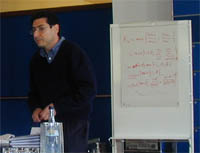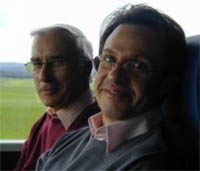| |
|
|
XIIth Summer School of the European Economic Association
FOURTH IZA EUROPEAN SUMMER SCHOOL IN LABOR ECONOMICS
"The Economics of Low Income and Low Paid Work"
|

|
|

|
In his lectures, Philippe Aghion explained how recent growth theories based on endogenous technical change and on the Schumpeterian idea of obsolescence can help to understand the evolution of income inequality. He mainly organized his lecture along two puzzles. The first puzzle was concerned with the evolution of between-group inequality in the past thirty years, in particular the rise of the college premium in the United States. The second puzzle was the rise of within-group inequality. He presented some of his recent and unpublished work in order to explain the two puzzles. Technical progress and in particular the implementation of General Purpose Technologies stands as a crucial factor in explaining the recent upsurge in wage inequality. Furthermore, he also discussed the relationship between endogenous growth and cross-country income differences.
|
|
|
| |
|
The lectures by Juan Dolado (photo below, right) analyzed the low-wage employment in Europe and the U.S. over the past three decades as a response to the problem of high and persistent unemployment in Europe and of growing globalization and skill-biased technological change. He conducted a detailed analysis of institutional arrangements, such as minimum wage legislation, collective bargaining, and anti-discriminatory measures to fight discrimination by gender. The lecture covered a descriptive part dealing with the evolution of low-wage employment in various countries, a section on the effects of minimum-wages on employment, a section on occupational discrimination by gender and a section on the issue of "overeducation" in some EU countries in order to analyze the extent to which education might fail to act as a way out of the low-employment trap. |
|
| |
|
In his series of four lectures, Peter Sloane (photo left) gave a review of the economics of low income and low paid work, with an emphasis on labor market segmentation. He discussed different key topics in labor market theory and empirics, such as the measurement of job satisfaction as a consequence of job qualities and externalities from coworkers' education. Peter Sloane dealt with the question of earnings mobility and wage growth in the low wage sector of four European economies relative to the United States.
Furthermore, the course gave insights into the topic of over- and undereducation. Definitions and measurement of these phenomena were discussed using empirical results for the British labor market. Special attention was paid to the analysis of over-education among graduates with an emphasis on different ethnical groups. Additional topics of discussion were the theory and empirics of discrimination of men and women.
|

|
|
|
| |
|
|
|
|